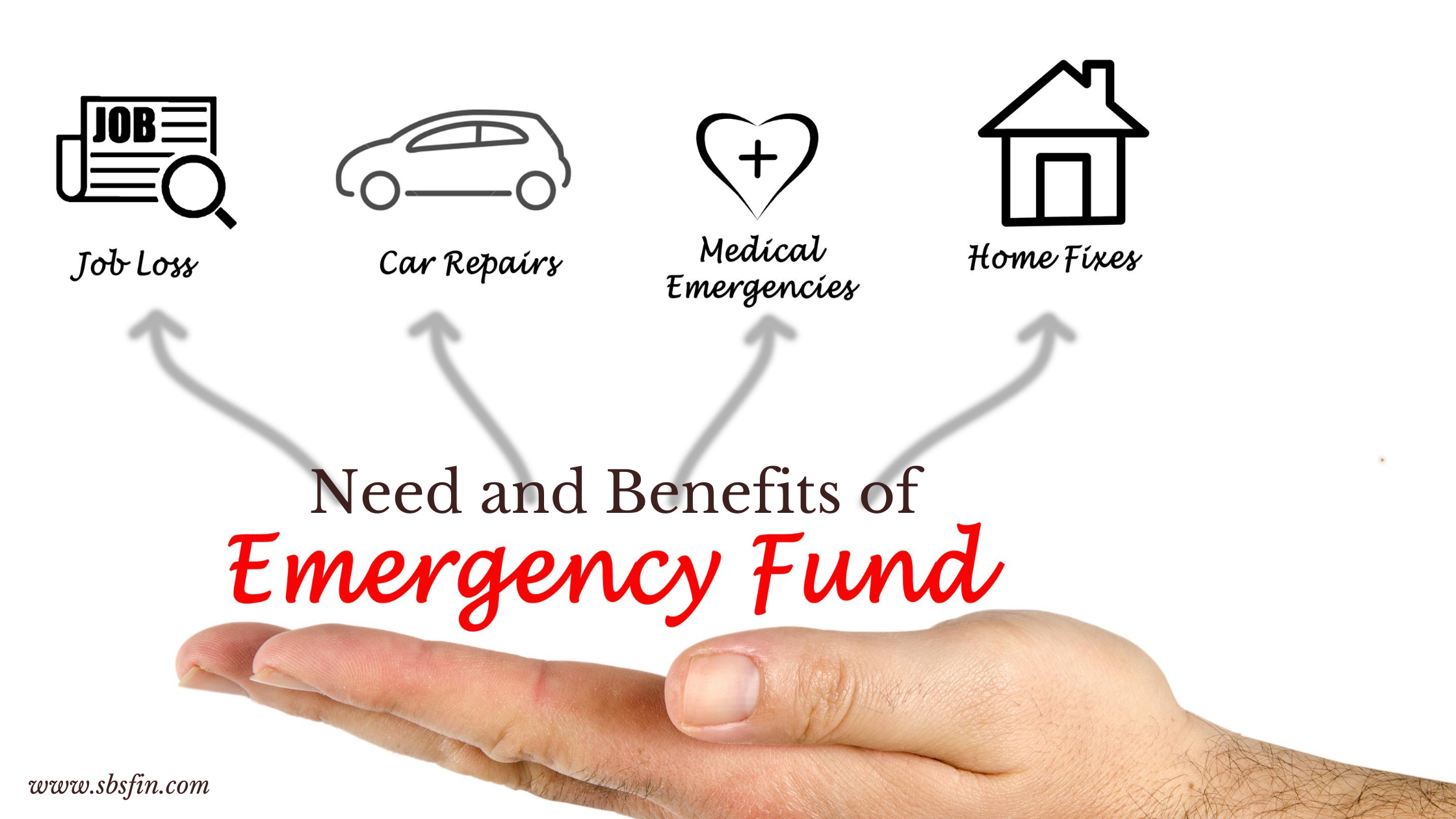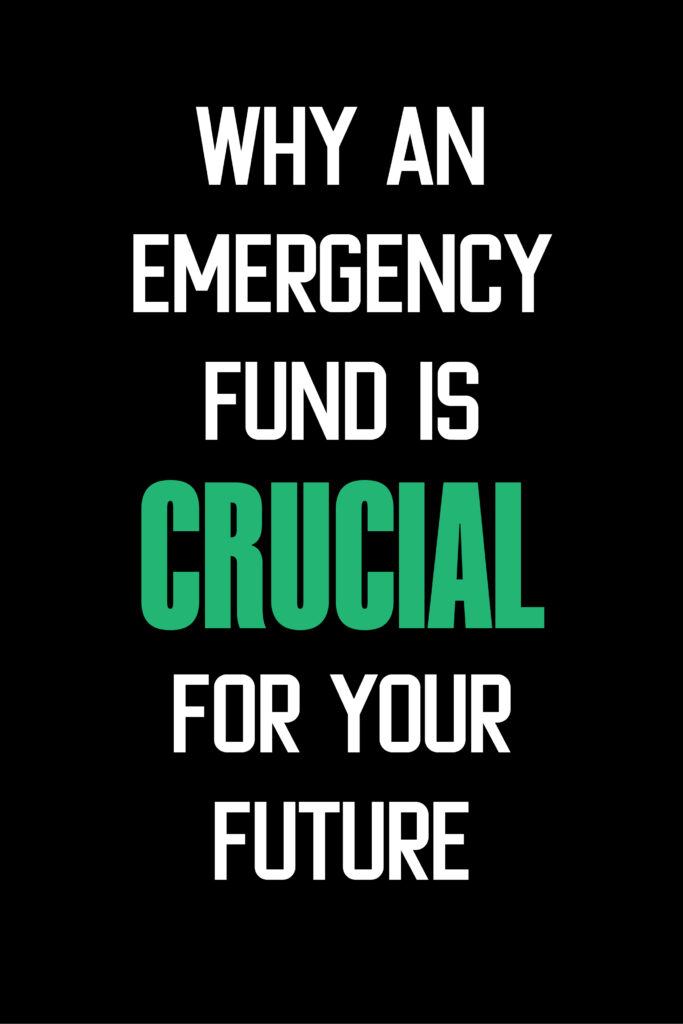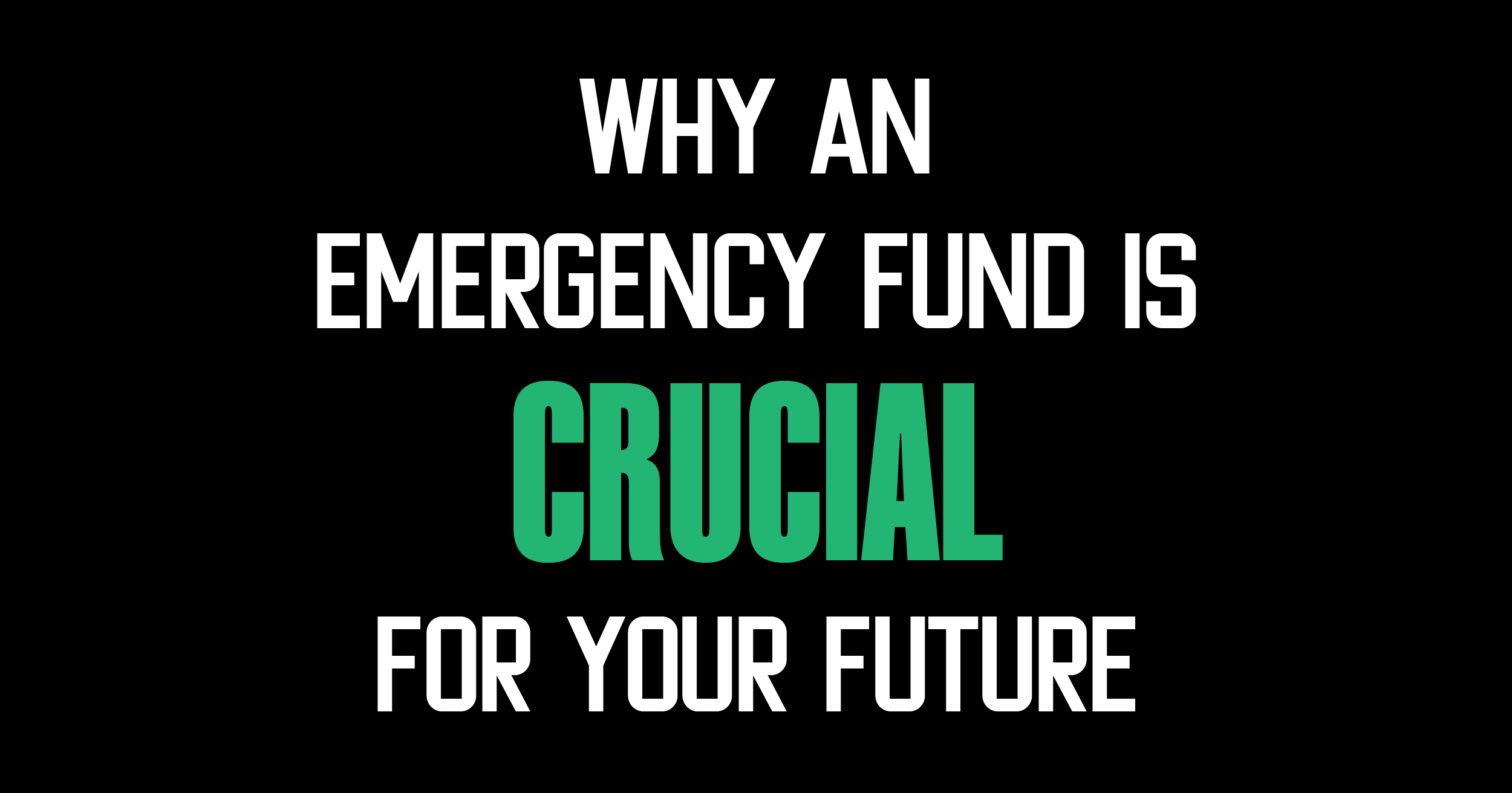An emergency fund is crucial for financial security, providing a safety net in unforeseen situations. It ensures money is available when unexpected expenses arise.
Building an emergency fund is a foundational step in creating a robust financial plan. It acts as a buffer against life’s unpredictable events, such as medical emergencies, job loss, or urgent home repairs, preventing the need to rely on high-interest credit options.
Starting with a small, manageable amount can gradually lead to a fund that covers several months of living expenses. This financial cushion allows individuals to make decisions without the stress of immediate financial strain, offering peace of mind and stability. Establishing and maintaining an emergency fund is a proactive measure that safeguards your financial well-being, enabling you to navigate through life’s challenges with confidence.

Credit: www.sbsfin.com
The Role Of An Emergency Fund In Financial Security
The Role of an Emergency Fund in Financial Security plays a crucial part in maintaining a stable financial life. An emergency fund acts as a safety net. It helps you avoid debt during unexpected events. Let’s explore how it ensures financial security.
Mitigating Financial Emergencies
An emergency fund is your first line of defense against sudden financial needs. These needs can include:
- Medical bills: Unexpected health issues can lead to high costs.
- Home repairs: Urgent fixes like a leaky roof need immediate attention.
- Job loss: It gives you breathing room until you find new employment.
By having funds set aside, you can cover these expenses without stress.
Peace Of Mind In Unpredictable Times
An emergency fund also offers mental comfort. Knowing you have money saved helps you stay calm. You don’t have to worry about:
- Borrowing money from friends or family.
- Using high-interest credit cards.
- Selling possessions in a rush.
This peace of mind is priceless. It allows you to focus on solving the problem.

Credit: fastercapital.com
Assessing Your Financial Vulnerability
Money issues can strike when least expected. An emergency fund acts as a financial shield. Without it, a single surprise expense can cause major stress. That’s why assessing your financial vulnerability is crucial. Let’s explore how to gauge your financial risk and prepare for the unexpected.
Identifying Potential Risks
Start by pinpointing what could go wrong. Consider job loss, medical emergencies, or car repairs. Think about family needs or natural disasters. List everything that might disrupt your financial peace.
- Job Security: Could your job be at risk?
- Health: Are there any ongoing health issues?
- Property: Is your home or car likely to need repairs?
- Family: Do you have dependents who could need sudden help?
Calculating Adequate Emergency Savings
Next, figure out how much money you need. A good rule is three to six months of expenses. This can cover bills, food, and housing if income stops. Use a simple table to track your monthly costs:
| Expense Category | Monthly Cost |
|---|---|
| Housing (rent/mortgage) | $1,200 |
| Utilities | $300 |
| Groceries | $400 |
| Transportation | $250 |
| Insurance | $150 |
Multiply your total monthly cost by three to six. This is your target emergency fund size.
Remember, these funds must be easily accessible. Think about a savings account or a money market fund. This way, you can get to your money fast when a crisis hits.
Setting Up Your Emergency Fund
Setting up an emergency fund is crucial for financial security. Unexpected events can arise at any time. Being prepared eases stress and avoids debt. Start building your emergency fund today. Follow these steps to create a solid financial cushion.
Choosing The Right Savings Vehicle
Select a savings account that fits your needs. Look for high interest rates and low fees. A high-yield savings account is often a good choice. This account keeps your money accessible and growing.
| Account Type | Pros | Cons |
|---|---|---|
| High-Yield Savings | Higher interest, easy access | May have minimum balance |
| Money Market | Potential for higher returns | Less accessible, higher risk |
| Certificate of Deposit (CD) | Fixed interest rate | No access before term ends |
Automating Your Savings
Automate your savings to ensure consistent contributions. Set up a direct transfer from your checking to your savings account. Choose a fixed amount to transfer regularly. This method helps build your fund effortlessly.
- Decide on a percentage of your income for savings.
- Set up automatic transfer for the day after payday.
- Monitor your fund and adjust contributions as needed.
Remember, starting small is better than not starting at all. Even a small monthly transfer grows over time. Your future self will thank you.
How Much Should You Save?
Building an emergency fund is crucial. It protects against life’s unexpected events. Knowing the right amount to save is key. Let’s explore how much you need in your emergency fund.
General Savings Guidelines
Financial experts often recommend saving. A common rule is the “3-6 months” guideline. This means saving enough to cover 3-6 months of living expenses. It’s a safety net for job loss or medical emergencies.
Consider these factors:
- Your monthly expenses
- Number of income earners in the household
- Job security
- Health considerations
Let’s break down the monthly expenses:
| Expense | Average Cost |
|---|---|
| Rent/Mortgage | $1,000 |
| Utilities | $300 |
| Groceries | $400 |
| Transportation | $250 |
| Insurance | $200 |
| Miscellaneous | $150 |
For a total of $2,300 monthly, save $6,900 – $13,800.
Customizing Your Savings Goal
One size does not fit all. Adjust your savings goal to fit your life. Start by assessing your unique situation. Job stability and health insurance are factors. Single-income households may need more savings. Dual-income households might need less.
Use these steps to customize your goal:
- Calculate your monthly expenses
- Assess your job security level
- Factor in dependents and health
- Set a target savings amount
- Plan to reach your goal gradually
For example:
A family with high medical costs might aim for 7 months’ expenses. A single person with a stable job might aim for 4 months’ expenses.
Remember, the goal is peace of mind. An emergency fund provides this. Tailor your emergency fund to ensure financial stability.

Effective Strategies To Build Your Fund Quickly
Building an emergency fund is a critical step in securing financial stability. Quick fund growth requires focus and smart tactics. Let’s explore effective strategies to boost your savings without delay.
Cutting Unnecessary Expenses
Track your spending to identify where you can save. Look for patterns in your monthly bills. Small changes can lead to big savings over time.
- Eat at home more often instead of dining out.
- Cancel unused subscriptions and memberships.
- Shop with a list to avoid impulse buys.
Use apps to monitor expenses. This makes it easier to cut costs.
Increasing Your Income
More money means a faster-growing emergency fund. Consider side jobs or selling items you no longer need.
- Ask for a raise or work overtime.
- Freelance in your field of expertise.
- Host a garage sale or sell online.
Use your skills to create a side hustle. This can significantly boost your income.
Managing Your Fund Wisely
Building an emergency fund is a smart move. Managing Your Fund Wisely is crucial. Let’s talk about how to do this right.
Avoiding Common Pitfalls
Many people make mistakes with their emergency funds. Here are some tips to avoid them:
- Don’t use the fund for non-emergencies.
- Don’t forget to replenish it after you use it.
- Keep track of your spending.
Maintaining Fund Accessibility
Your emergency fund must be easy to get when needed. Here’s how:
- Choose an account with easy access.
- Check for no penalty on withdrawals.
- Ensure it’s separate from your main account.
Remember, a well-managed emergency fund can be a lifesaver. Start today!
When To Use Your Emergency Fund
Knowing when to use your emergency fund is crucial. It’s easy to dip into these savings. But you should do so wisely. Let’s explore legitimate reasons and how to resist non-emergency temptations.
Legitimate Reasons For Withdrawal
- Medical emergencies: Unexpected health issues.
- Job loss: Income stops suddenly.
- Urgent home repairs: A leaky roof or broken heater.
- Car troubles: Necessary for work commutes.
- Unavoidable travel: Family emergencies out of town.
These events are why you have an emergency fund. They are unplanned and urgent. They impact your safety or income.
Resisting Temptation For Non-emergencies
Exercise discipline with your emergency fund. Treat it as untouchable for everyday wants.
| Non-Emergency | Action to Resist |
|---|---|
| Sales | Wait. Save separately for deals. |
| Vacations | Plan ahead. Budget for travel. |
| Gifts | Set a gift fund. Don’t touch savings. |
| Upgrades | Use if broken only. Save for wants. |
Your fund is for real emergencies. Using it wisely ensures security. It gives peace of mind.

Credit: www.merriman.com
Replenishing Your Fund After Use
Life can bring unexpected expenses. Your emergency fund is a safety net. Sometimes you need to tap into this fund. Afterward, it’s crucial to refill it. Let’s explore steps to replenish your emergency fund.
Getting Back On Track
Review your fund usage. Note the amount used. Set a goal to replenish it. Create a timeline for this goal.
- Identify small savings areas
- Consider side jobs for extra income
- Put any windfalls, like tax returns, into your fund
Adjusting Your Budget
Analyze your budget. Look for non-essential items to cut. Redirect this money to your emergency fund.
| Expense | Monthly Cost | Action |
|---|---|---|
| Cable TV | $60 | Cancel or downgrade |
| Gym Membership | $35 | Suspend or find alternatives |
| Eating Out | $150 | Reduce by half |
Every dollar saved helps. Set up automatic transfers to your emergency fund.
Long-term Benefits Of Emergency Preparedness
An emergency fund is a financial safety net. It helps in times of unexpected expenses. It’s not just about having money for immediate needs. An emergency fund offers long-term benefits too.
Enhancing Financial Resilience
Financial resilience means handling financial shocks with ease. An emergency fund is key for this resilience. It allows you to cover sudden costs without stress. This could be a car repair or a medical bill. With an emergency fund, you avoid debt traps like high-interest loans.
Contributing To Overall Well-being
Emergency funds contribute to peace of mind. Knowing you have funds for a crisis reduces worry. This leads to better mental health. It also improves quality of life. You make better decisions when you are not stressed about money.
Preparedness with savings also boosts confidence. You feel ready for life’s ups and downs. This confidence spills into other areas of life.
- Less stress over finances
- Improved mental health
- Confident decision-making
Frequently Asked Questions
What Is An Emergency Fund And Why Is It Important?
An emergency fund is a reserve of money set aside to cover unexpected expenses or financial downturns. It’s crucial for financial security and stress reduction, ensuring you can handle life’s surprises without going into debt.
Why Is It Important To Have 3 To 6 Months Salary Saved For An Emergency Fund?
Having 3 to 6 months of salary saved in an emergency fund is crucial for financial security. It covers unexpected expenses or job loss, ensuring stability without relying on debt. This buffer allows for peace of mind during unforeseen situations, keeping your finances on track.
When You Have A $500 Emergency Fund You Should?
Once you have a $500 emergency fund, prioritize maintaining it. Use it strictly for genuine emergencies. Aim to gradually increase this fund over time to cover larger unexpected expenses. Always replenish it after use to ensure financial security.
Is 30k A Good Emergency Fund?
A $30,000 emergency fund is generally considered solid, as it can cover 3-6 months of living expenses for most households, providing a good financial safety net.
Conclusion
Building a solid emergency fund is your financial safety net. It’s essential for peace of mind and securing your future against unforeseen expenses. Start small, save consistently, and watch your reserve grow. Remember, financial preparedness is a cornerstone of a stress-free life.
Take action now and enjoy the stability it brings.

